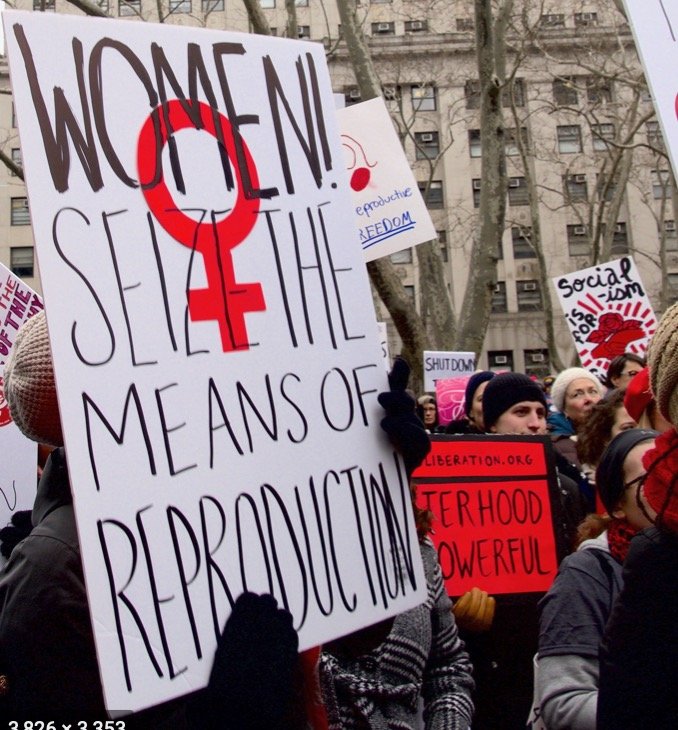Reproductive Labor Strike [$20 Suggested]
Instructor: Andrews | Tuesday | July 12 | 7:30-9:00 PM ET
Social Reproduction Theory teaches us that one of capitalism’s dirty secrets is that for the rich and powerful to profit, it needs some labor to go unpaid and underpaid, such as childbearing, child-rearing, cleaning, cooking, teaching. While we tend to think of abortion as an issue of bodily autonomy, lack of access will have dire economic repercussions for those who are forced to give birth, and it gives economic control to those who benefit from this unpaid, forced labor. What if all of us who do or could be forced to do the labor of social reproduction went on strike!? What if we refused to cook, clean, care, raise children, smile, or be nice and accommodating? Putting economic pressure on the state may be our most powerful option for political change. In this session we’ll look at two historical precedents: the Wages for Housework movement and the Icelandic Women’s Strike. And we’ll discuss the efficacy of a gendered labor strike and what it might look like today.
—
Direct student donations are a crucial aspect of our funding model, and without them, we are not able to pay instructors a living wage. We encourage you to pick the payment tier that corresponds with your needs, but ask that you please consider our commitment to fair labor practices when doing so.
If it is difficult right now for you to make a donation, here is a promo code to register for the teach-in at no cost: JAHQSRB.
If you would like to pay it forward in the future, you can make a one-time donation to our general scholarship fund.
Instructor: Andrews | Tuesday | July 12 | 7:30-9:00 PM ET
Social Reproduction Theory teaches us that one of capitalism’s dirty secrets is that for the rich and powerful to profit, it needs some labor to go unpaid and underpaid, such as childbearing, child-rearing, cleaning, cooking, teaching. While we tend to think of abortion as an issue of bodily autonomy, lack of access will have dire economic repercussions for those who are forced to give birth, and it gives economic control to those who benefit from this unpaid, forced labor. What if all of us who do or could be forced to do the labor of social reproduction went on strike!? What if we refused to cook, clean, care, raise children, smile, or be nice and accommodating? Putting economic pressure on the state may be our most powerful option for political change. In this session we’ll look at two historical precedents: the Wages for Housework movement and the Icelandic Women’s Strike. And we’ll discuss the efficacy of a gendered labor strike and what it might look like today.
—
Direct student donations are a crucial aspect of our funding model, and without them, we are not able to pay instructors a living wage. We encourage you to pick the payment tier that corresponds with your needs, but ask that you please consider our commitment to fair labor practices when doing so.
If it is difficult right now for you to make a donation, here is a promo code to register for the teach-in at no cost: JAHQSRB.
If you would like to pay it forward in the future, you can make a one-time donation to our general scholarship fund.
Instructor: Andrews | Tuesday | July 12 | 7:30-9:00 PM ET
Social Reproduction Theory teaches us that one of capitalism’s dirty secrets is that for the rich and powerful to profit, it needs some labor to go unpaid and underpaid, such as childbearing, child-rearing, cleaning, cooking, teaching. While we tend to think of abortion as an issue of bodily autonomy, lack of access will have dire economic repercussions for those who are forced to give birth, and it gives economic control to those who benefit from this unpaid, forced labor. What if all of us who do or could be forced to do the labor of social reproduction went on strike!? What if we refused to cook, clean, care, raise children, smile, or be nice and accommodating? Putting economic pressure on the state may be our most powerful option for political change. In this session we’ll look at two historical precedents: the Wages for Housework movement and the Icelandic Women’s Strike. And we’ll discuss the efficacy of a gendered labor strike and what it might look like today.
—
Direct student donations are a crucial aspect of our funding model, and without them, we are not able to pay instructors a living wage. We encourage you to pick the payment tier that corresponds with your needs, but ask that you please consider our commitment to fair labor practices when doing so.
If it is difficult right now for you to make a donation, here is a promo code to register for the teach-in at no cost: JAHQSRB.
If you would like to pay it forward in the future, you can make a one-time donation to our general scholarship fund.

